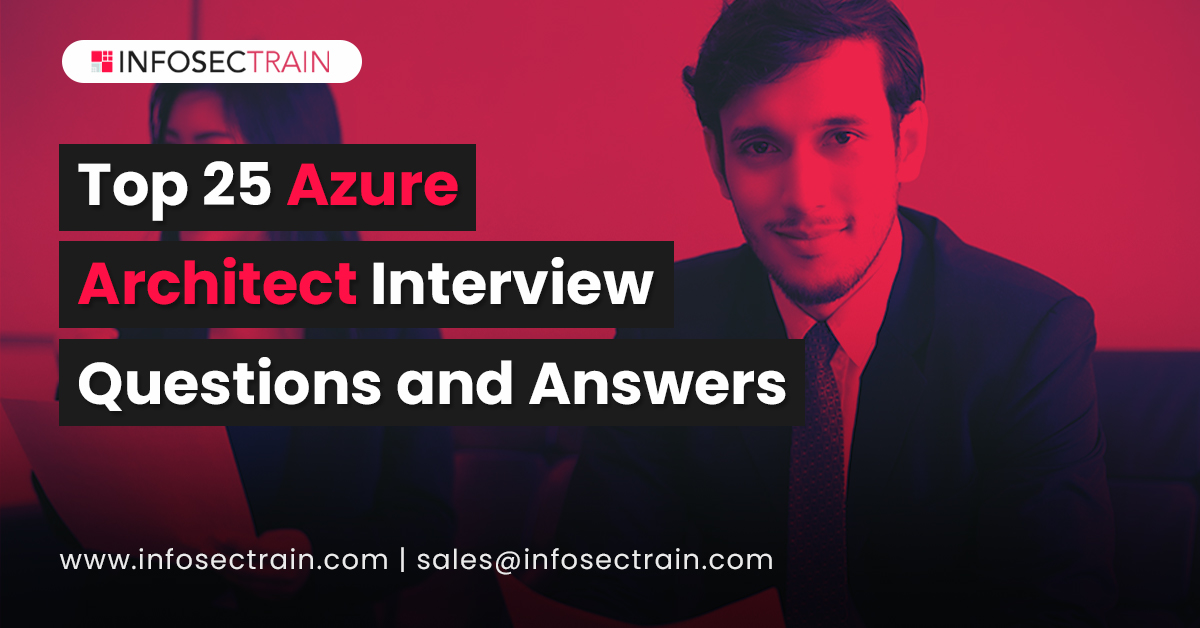Top 25 Azure Architect Interview Questions and Answers
Microsoft Azure is the second most prevailing Cloud service provider in the market. Microsoft Azure is trusted by more than 80% of the Fortune 500 companies for their Cloud service requirements due to its compelling IaaS solutions. So, there are numerous organizations that are hiring Azure certified experts for various internal job roles. One of the profoundly great and most favored Azure job roles is that of a Cloud Solutions Architect.

If you are among the candidates trying to find a decent line of work as an Azure Architect, you must prepare yourself well to land your dream job. Here is a list of 25 Azure Architect job interview questions asked to an aspiring Azure Solution Architect.
Question 1: What is Azure Cloud Service?
Answer: Azure Cloud Service provides the option for conveying multiple web applications in Azure while specifying various parts for the dissemination of management and permission for flexible scaling in an application. Basically, a particular cloud service includes web parts and specialist parts in some cases with their own specific application documents and design.
Question 2: What are the roles of Windows Azure?
Answer: You can find three types of roles in Windows Azure, such as web role, virtual machine role, and worker role.
Question 3: What are the three significant components of the Azure platform?
Answer: The three significant components of Microsoft Azure are Compute, Fabric, and Storage that are present as Azure Compute, Azure AppFabric, and Azure Storage.
Question 4: Define a Cloud architecture?
Answer: A Cloud Architect is an IT expert who builds up an organization’s computing strategy. This strategy fuses cloud adoption plans, cloud application design, and cloud management and monitoring. The Architect likewise helps with various cloud environments such as the public Cloud, private Cloud, and hybrid Cloud.
Question 5: What are the different Layers of Cloud architecture?
Answer: The Cloud Architecture consists of the following layers:
- Infrastructure: The primary layer of Cloud is the Infrastructure –IaaS, which stands for Infrastructure as a service.
- Platform: The second layer of the Cloud is the Platform – PaaS, which stands for Platform as a service.
- Software: The third Cloud layer is the actual Software – SaaS, which stands for Software as a service.
- BPO.
Question 6: What are the different layers in a cloud reference model?
Answer: The five layers of a Cloud reference model are:
- Physical layer,
- Virtual layer,
- Control layer,
- Service orchestration layer, and
- Service layer
Question 7: What are the various components of the cloud architecture?
Answer: The prime physical components of cloud infrastructure are networking equipment, servers, and data storage. Cloud infrastructure incorporates a hardware abstraction layer as well. The layer enables the virtualization of resources and helps to cut down costs through economies of scale.
Question 8: Which is the most basic cloud service model?
Answer: The most basic cloud service model is the Saas that is Software as a Service model. It is one of the most familiar forms of cloud service for consumers, and it also reallocates the assignment of managing software and its deployment to third-party services.
Question 9: How will you differentiate between a software architect and a solution architect?
Answer: A Solution Architect is answerable for a solitary application or technology product, including both hardware and software, while a Software Architect is answerable for the general plan of an application, especially when there are many subcomponents that need to work together.
Question 10: What does an Azure Solution Architect do?
Answer: The main roles of an Azure Solution Architect are to develop and implement an Azure Cloud Architecture and manage issues like migration. It also incorporates estimating and planning the solutions expected to implement cloud migration and continued operations.
Question 11: What is a service definition file and service configuration file?
Answer: The cloud service definition file (.csdef) gives the definition of the assistance model, close by the number of jobs. Then again, the cloud service configuration file (.csfg) encourages configuration settings for cloud service and individual roles alongside the number of role instances.
Question 12: Define Azure Diagnostics.
Answer: Azure Diagnostics is an Azure API that helps in the collection of diagnostics data from applications that are implemented on Azure. Azure Diagnostics ought to be enabled for various cloud service roles to ensure the activation of verbose monitoring.
Question 13: What are the different cloud deployment models?
Answer: There are three regular cloud deployment models that explain the delivery of cloud services to users. These are the public Cloud, the hybrid Cloud, and the private Cloud.
Question 14: What are the advantages of traffic managers in Azure?
Answer: Some of the notable benefits of traffic managers in Azure incorporate the distribution of traffic as per the different traffic-routing methods and consistent monitoring of automatic failover and endpoint health upon failure of endpoints.
Question 15: What is an Azure SLA (Service Level Agreement)?
Answer: SLA establishes the degree of service you anticipate from a vendor, designing out the metrics by which service is estimated, as well as remedies or penalties should agreed-on service levels not be accomplished. It is a crucial segment of any technology vendor contract. The Azure SLA (Service-level agreement) explains the commitments of Microsoft for uptime and connectivity.
Question 16: What is a guest operating system?
Answer: A guest operating system for a concerned cloud service is an operating system installed on virtual machines that run your application code.
Question 17: What is Azure Resource Manager?
Answer: Azure Resource Manager is the ideal assistance for provisioning management and deployment services on Azure. The management layer aids in enhancing and deleting resources in your Azure subscription. It likewise supports the organization of related resources in resource groups, followed by the deployment of resources with JSON formats.
Question 18: What are Update Domains?
Answer: Update domain in Azure displays the collection of underlying hardware equipped for rebooting or undergoing maintenance. With the development of virtual machines in an availability set, virtual machines are consequently distributed across updated domains on the Azure platform. Subsequently, a single instance of the application is always active during the maintenance of the Azure platform.
Question 19: What is a Fault Domain?
Answer: The fault domain in Azure showcases the set of underlying hardware sharing common network switches and power sources. Each and every fault domain incorporates various racks, and all individual racks accommodate a virtual machine. Upon the development of virtual machines in an availability set, the virtual machines consequently spread across all fault domains in Azure.
Question 20: Define Azure Service Fabric.
Answer: Azure Service Fabric is the distributed platform custom-made for offering development, deployment, and management of apps having high scalability and customizability. Applications developed in the Azure Service Fabric environment would involve discrete microservices communicating with one another over service application programming interfaces.
Question 21: What are the types of services you can develop with the Service Fabric?
Answer: The two kinds of services that you can develop with Azure Service Fabric are Stateless Services and Stateful Services. On account of stateless services, the service does not store any state, and the long-term state is stored in an external database. On the other hand, Stateful services have the state stored in the service. Additionally, it enables the state to persist without any external database.
Question 22: What are the deployment environments offered by Azure?
Answer: There are two deployment environments provided by the Azure Cloud:
1. Staging Environment:
- It gives a stage to approve changes to your application before it tends to be made live in the production environment.
- In this stage, the application can be distinguished utilizing Azure’s Globally Unique Identifier (GUID) in URL form (GUID.cloudapp.net)
2. Production Environment:
- This environment is utilized to store the live app.
- It can be modified from the staging environment with a URL that’s more DNS friendly (servicename.cloudapp.net)
Question 23: How can hybrid cloud Integration be useful for Azure?
Answer: The Hybrid Cloud helps profitability by utilizing Azure and the Azure stack for creating and deploying apps for the Cloud and on-premises apps. Integration of the hybrid Cloud can be useful for Azure in the accompanying manners:
- It acquires more prominent effectiveness with a combination of Azure services and DevOps processes and tools
- Clients can profit from consistently updated Azure services and other Azure Marketplace apps.
- It allows it to be deployed regardless of its location, the Cloud, or on-premises.
- It empowers apps to be made at a higher speed.
Question 24: Mention the components of the Azure Cloud architecture.
Answer: The Azure Cloud architecture has the following components:
- Backend systems
- Azure Logic Apps
- Azure API Management
- Azure DNS
- Azure Active Directory (Azure AD)
Question 25: Define cloud delivery model?
Answer: A cloud delivery model addresses a particular, pre-bundled combination of IT resources offered by a cloud service provider. Three common cloud delivery models have gotten broadly settled and formalized:
- Infrastructure-as-a-Service (IaaS)
- Platform-as-a-Service (PaaS)
- Software-as-a-Service (SaaS)
A good cloud architect must not only possess strong technical skills in enterprise computing, but they must understand the building blocks of IT. It incorporates client systems and applications, networking, infrastructure, data centers, programming languages, web tools & technologies, databases, and big data, and ERP.
You can begin your preparations for the Azure architect interview. In order to land up a promising Azure architect job, you must have adequate support. You need to experience a great deal of training, hands-on experience, and practice before you can qualify for an Azure architect interview seamlessly. You can likewise focus on getting your hands on the Azure Architect expert certification to increase your chances of finding a decent line of work. In this series of events, you can check training and certification courses for the AZ-303 / AZ-300 Microsoft Azure Architect Technologies Online Training & Certification Course and AZ-304/AZ-301 Microsoft Azure Architect Design Online Training & Certification Course. Begin the preparation now if you want to propel your profession as an Azure Architect.








 1800-843-7890 (India)
1800-843-7890 (India)